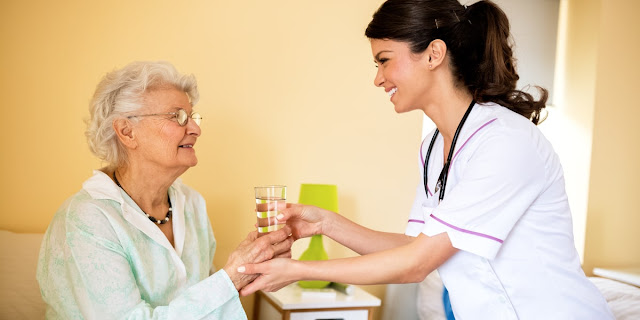How do Care Professionals Help Seniors Fight Dehydration?
How to Prevent Dehydration in Elderly?
Elderly are at an increased
risk of low-intake dehydration as age, reduced muscle mass and kidney functions
decrease the water stores in the muscles. Older people, who have issues regarding
urinary incontinence or need assistance to get to the toilet, will also
consciously avoid drinking enough water, thus increasing the danger of
dehydration.
Many care home services in Droitwich have
patients that have trouble remembering to drink any fluids or have problems in
swallowing water or accessing fluids. Recovery from dehydration in elderly is
much more complication and a painful process, due to which health care
professionals in most care homes help the residents drink enough water to avoid
any dangers of dehydration.
Tips to Help Patients Avoid Dehydration
Here are some top tips
that professionals in care home services in Bromsgrove rely
on when helping their residents stay hydrated and healthy.
1.
All elderly should be considered to be at a risk for
low intake dehydration and should be offered water throughout the day to
encourage adequate hydration.
2.
Care home residents should be encouraged to drink more
fluids by offering them a variety of flavoured drinks based on their preferences
to facilitate the process of hydration.
3.
The care home professionals should identify the barriers
or promoters of drinking fluids and should take necessary measures to support
drinking schedules of residents and record them in their personalized health
care plans.
4.
The care home services in Droitwich implement strict strategies
by increasing the availability, as well as variety of drinks, and encouraging
the staff to offer water or drinks frequently throughout the day. One of the best
tips to help patients avoid dehydration is to enhance staff awareness by
helping them understand the importance of adequate drinking and offering them
training to help patients with incontinence drink enough fluids.
5.
Diversifying liquid intake and adding grape, prune or
apple juice can increase the elderly’s interest in consuming more fluids and
are beneficial for health as they are also rich in electrolytes. They have high
amounts of nutrients, which will help replenish the residents’ energy.



Comments
Post a Comment